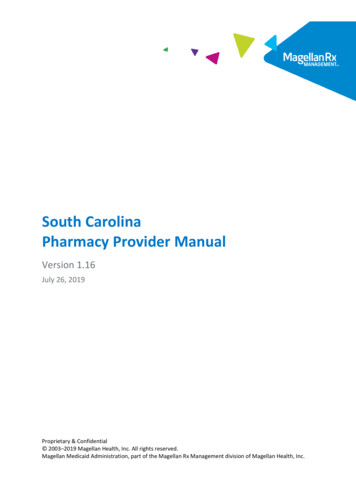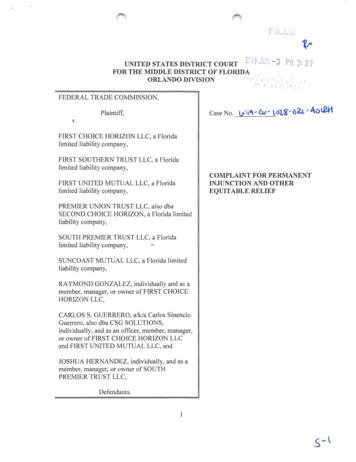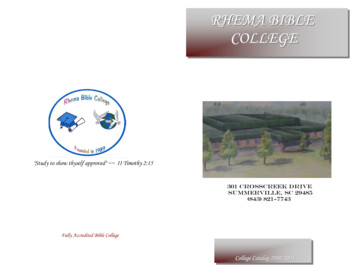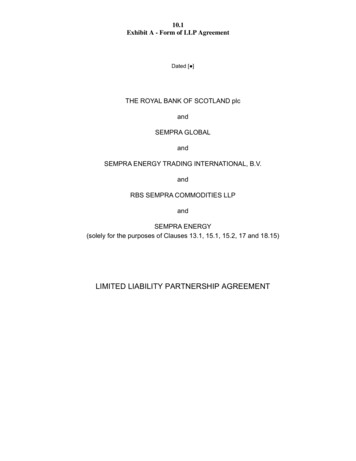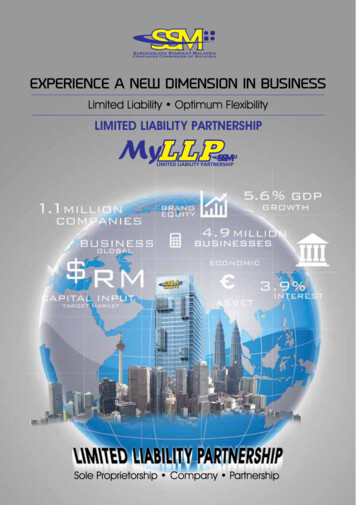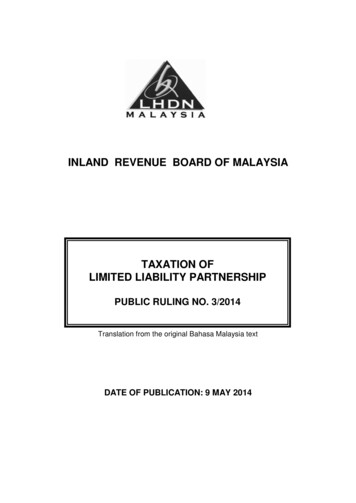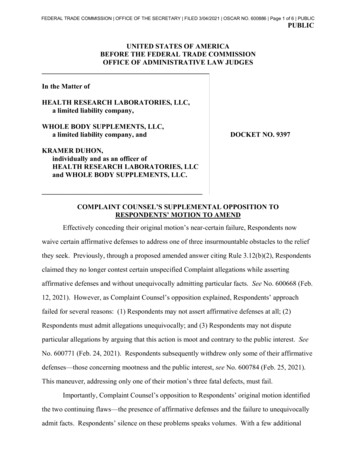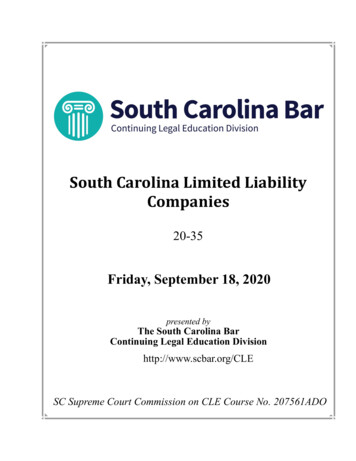
Transcription
South Carolina Limited LiabilityCompanies20-35Friday, September 18, 2020presented byThe South Carolina BarContinuing Legal Education Divisionhttp://www.scbar.org/CLESC Supreme Court Commission on CLE Course No. 207561ADO
Table of ContentsAgenda . 3Speaker Biographies . 4Overview of the S.C. Uniform Limited Liability Company Act .7David A. Merline, Jr. and Scott Y. BarnesChoice of Entity .88Scott Y. BarnesCapital Accounts .151Scott Y. BarnesSecurities .179Suzanne H. ClawsonSingle Members LLCs, LLCs taxed as S Corps, Professional LLCs, LLCs used in EstatePlanning .204David A. Merline, Jr.Case Law Update .230Stafford J. McQuillin, IIICurrent Events in Ethics and Discipline .231Barbara SeymourSC Bar-CLE publications and oral programs are intended to provide current and accurate informationabout the subject matter covered and are designed to help attorneys maintain their professionalcompetence. Publications are distributed and oral programs presented with the understanding that the SCBar-CLE does not render any legal, accounting or other professional service. Attorneys using SC Bar-CLEpublications or orally conveyed information in dealing with a specific client's or their own legal mattersshould also research original sources of authority. 2020 by the South Carolina Bar-Continuing Legal Education Division. All Rights ReservedTHIS MATERIAL MAY NOT BE REPRODUCED IN WHOLE OR IN PART WITHOUT THEEXPRESS WRITTEN PERMISSION OF THE CLE DIVISION OF THE SC BAR.TAPING, RECORDING, OR PHOTOGRAPHING OF SC BAR-CLE SEMINARS OR OTHER LIVE,BROADCAST, OR PRE-RECORDED PRESENTATIONS IS PROHIBITED WITHOUT THE EXPRESSWRITTEN PERMISSION OF THE SC BAR - CLE DIVISION.
LIVE WEBCASTSouth Carolina Limited Liability CompaniesSeptember 18, 2020This program qualifies for 5.0 MCLE Credit Hours, including up to 1.0 LEPR Credit HourSC Supreme Commission on CLE Course #:207561ADO8:50 a.m.Welcome and Opening Remarks9:00 a.m.Overview of the S.C. Uniform Limited Liability Company ActDavid A. Merline, Jr., Merline & Meacham, PAScott Y. Barnes, Haynsworth Sinkler Boyd, PA10:00 a.m.Choice of EntityScott Y. Barnes, Haynsworth Sinkler Boyd, PA10:20 a.m.Break10:35 a.m.Capital AccountsScott Y. Barnes, Haynsworth Sinkler Boyd, PA11:05 a.m.SecuritiesSuzanne H. Clawson, Haynsworth Sinkler Boyd, PA11:35 a.m.Single Members LLCs, LLCs taxed as S Corps, Professional LLCs, LLCs used in EstatePlanningDavid A. Merline, Jr., Merline & Meacham, PA12:15 p.m.Lunch Break1:15 p.m.Case Law UpdateStafford J. McQuillin, III, Haynsworth Sinkler Boyd, PA2:15 p.m.Current Events in Ethics and DisciplineBarbara Seymour, Clawson & Staubes, LLC3:15 p.m.Adjourn
South Carolina Limited LiabilityCompaniesSPEAKER BIOGRAPHIES(by order of presentation)David A. Merline, Jr.Merline & Meacham, PA(course planner)Professional Qualifications South Carolina Supreme Court, Certified Specialist in Taxation Law South Carolina Supreme Court, Certified Specialist in Estate Planning and Probate Law AV Preeminent rated by Martindale-Hubbell Peer Review Ratings Professional Associations and Memberships American College of Trust and Estate Counsel (Fellow) American Bar Association – Business Law Section (Member) South Carolina Bar – Probate, Estate Planning and Trust Section (Member) South Carolina Bar – Tax Law Section (Member) Greenville County Bar Association (Member) Greenville Estate Planning Council (Member) Greenville County Estate Planning Study Group (Member) Rotary Club of Greenville – Paul Harris FellowAwards and Honors Ranked as a Leading Attorney in Private Wealth Law in South Carolina by Chambers Professional Advisers (2019– 2020) Listed in The Best Lawyers in America for 2021 in the fields of: o Corporate Law (Lawyer of the Year 2021 inGreenville, SC)o Employee Benefits (ERISA) Law (Lawyer of the Year 2017 in Greenville, SC)o Litigation – ERISA (Lawyer of the Year 2019 in Greenville, SC)o Litigation – Trusts and Estateso Litigation and Controversy -Taxo Mergers & Acquisitions Lawo Non-Profit/Charities Lawo Tax Law (Lawyer of the Year 2010 in Greenville, SC)o Trusts and Estates (Lawyer of the Year 2018 in Greenville, SC) Best Lawyers in America previous Lawyer of the Year in the fields of: o Business Organizations (includingLLCs and Partnerships) (Lawyer of the Year 2013, 2016 and 2020 in Greenville, SC)o Closely Held Companies and Family Businesses Law (Lawyer of the Year 2014 in Greenville, SC) Greenville Business Magazine Legal Elite (2012-Present) South Carolina Super Lawyers (2008-Present)Education University of Miami, (LL.M) Taxation (1985) University of South Carolina School of Law, (J.D.) (1983) Furman University, (B.A.) Magna Cum Laude (1980)Publications and Presentations
Scott Y. BarnesHaynsworth Sinkler Boyd, PAScott Y. Barnes is Of Counsel to the law firm of Haynsworth Sinkler Boyd, PA in its Charleston, South Carolina office.His practice revolves around federal and state tax issues as they relate primarily to real estate transactions, partnership taxation, limited liability companies, conservation easements and corporate formation and operations. He is anadjunct professor at the Charleston School of Law where he teaches a class on Limited Liability Companies and wasformerly an adjunct professor at the University of South Carolina School of Law. He has been listed for the last 27years in The Best Lawyers in America by Woodward White, Inc. in the Corporate, Business Organizations (includingLLC and Partnerships) and Tax Sections, and was named Charleston Lawyer of the Year for 2011 in Corporate Lawand 2012 for Tax Law. He is currently and has been listed as a South Carolina Super Lawyer for tax since 2008.Suzanne H. ClawsonHaynsworth Sinkler Boyd, PASuzi is a shareholder with Haynsworth Sinkler Boyd, P.A. She represents both public and private issuers with respect to securities registration and exemptions from registration and reporting compliance issues, while also advisingpublic and private company clients on both sides of merger and acquisition transactions. Suzi has participated ascounsel in numerous IPOs and other registered offerings. She routinely advises public companies on SEC annualand quarterly reporting requirements, proxy matters, and insider trading issues, as well as stock exchange listing andreporting requirements. She has also acted as counsel in going private transactions, tender offers and proxy contests.Suzi also advises on corporate governance issues, including corporate structure, committee charters and governance principles, director and committee independence, related party transaction issues, and fiduciary duties of directors.Stafford J. McQuillin, IIIHaynsworth Sinkler Boyd, PAA versatile litigation attorney with deep ties to his native Charleston, South Carolina, Mac McQuillin blends an established LLC and partnership litigation practice with an emerging practice as a certified Circuit Court Mediator. He frequently represents managers and members of LLCs in “business divorce” cases involving breach of fiduciary duty,oppression, buy out disputes, and misappropriation of company funds. He has participated in numerous mediationsinvolving LLC and partnership disputes as both an advocate and as a mediator. He regularly advises LLC and partnership clients in complex matters, and has extensive experience with both jury and non-jury trials. As lead trialcounsel, Mac recently tried to verdict an LLC derivative action, involving multi-million dollar claims.Mac is listed in The Best Lawyers in America Commercial Litigation (2020-2021) and South Carolina Super Lawyers “Rising Stars” Business Litigation (2014-2020). In 2017, Mac was awarded the South Carolina Lawyers Weekly Leadership in Law Award and recognized by Charleston Business Magazine as one of the "Legal Elite of the Lowcountry."Mac is a frequent speaker on LLC and litigation topics, including "Irreconcilable Differences - LLC Disputes - Business Divorce Cases,” “Managing Your Liability When Clients Breach Their Fiduciary Duties,” and "How to Get YourSocial Media, Email and Text Evidence Admitted (and Keep Theirs Out)." University of South Carolina, J.D., cum laude, 2009 (Order of Coif) University of South Carolina, B.A., magna cum laude, 2005
Barbara SeymourClawson & Staubes, LLCBarbara Seymour represents lawyers, law firms, judges, and law students in matters related to ethics, professionaldiscipline, and Bar admissions at the law firm of Clawson and Staubes, LLC in Columbia, SC. She earned her Bachelor’s Degree in Management and Marketing from the University of North Carolina at Greensboro in 1990 and herJuris Doctor from the University of Georgia in 1993. Barbara worked as a trial lawyer at Harris & Graves until 2000when she joined the staff of the Office of Disciplinary Counsel. She served as the Deputy Disciplinary Counsel from2007 until 2017. Barbara is a member of the South Carolina Bar, the Georgia State Bar, the Association of Professional Responsibility Lawyers, the South Carolina Association of Ethics Counsel, and the South Carolina WomenLawyers Association. She currently serves on the Law Related Education, Professional Responsibility, UnauthorizedPractice of Law, Future of the Profession, and Diversity Committees at the South Carolina Bar. She was a 2006 and2011 Fellow of the National Institute for the Teaching of Ethics and Professionalism. Barbara has served as an adjunct instructor in the Professional Legal Assistants Program at Converse College and the Paralegal Degree Program at Midlands Technical College. Her courses have included Civil Litigation, Legal Research & Writing, BusinessLaw, Torts, Legal Ethics, and Law Office Management. www.linkedin.com/in/barbaraseymour
Overview of the S.C. Uniform Limited LiabilityCompany ActDavid A. Merline, Jr.Scott Y. Barnes
OVERVIEW OF THE 1996 UNIFORMLIMITED LIABILITY COMPANY ACTSouth Carolina Bar September 18, 2020Scott Y. Barnes, Haynsworth Sinkler Boyd, P.A.David Merline, Jr., Merline & Meacham, P.A.
OVERVIEW South Carolina remains under the 1996Uniform Act and has not adopted the 2006Uniform Limited Liability Company Act.2
FORMING THE LLC
FORMING THE LLC At Will v. Term––At will – perpetual existenceTerm – specific term4
CHARGING ORDER TRAP– Creditor of a member in an at will company can foreclosethat member's membership interests.– The creditor following foreclosure has the rights of atransferee.– A transferee in an at will company can require the limitedliability company to purchase the transferee creditorsdistributional interest for fair value.– Term company transferee creditor can only be bought out atthe end of the term.5
WITHDRAWAL RIGHTS UNDER THE ACT At Will – Member may withdraw at any time. Term – Member may withdraw only at the endof the term.6
"MANAGER MANAGED/MEMBER MANAGED" Manager Managed – only the manager hasapparent authority to act on behalf of the LLC Member Managed – all members haveapparent authority to act on behalf of the LLC7
DESIGNATED OFFICE/DESIGNATED AGENT Designated office must be located in SouthCarolina. Registered Agent must be:– a resident of South Carolina, or– a domestic corporation or LLC, or– a foreign company authorized to do business in SC8
NAME AND NUMBER OF MEMBERS Name– "Limited Liability Company", "Limited Company","L.L.C.", "LLC", "L.C.", "LC" or "Ltd. Co." Number of Members– An LLC can have as few as one member– An LLC can have an unlimited number of members9
CAPITAL CONTRIBUTIONS Members of an LLC have a capital account. Capital accounts go up by the amount of:– Cash or the fair market value of propertycontributed by a member– Profits allocated to a member Capital accounts go down by the amount of:– Cash or the fair market value of propertydistributed to a member– Losses allocated to a member10
LLC IS A SEPARATE LEGAL ENTITY Once the Articles of Organization are filed, anLLC is an entity separate and distinct from itsmembers. A membership interest in an LLC is an item ofpersonal property.11
KNOWLEDGE AND NOTICE
KNOWLEDGE AND NOTICE An LLC has knowledge and notice when anindividual conducting the transaction for theLLC knows, has notice, or receives a notificationof the fact or when the fact would have beenbrought to the individuals attention had theentity exercised reasonable diligence.13
FINANCIAL STRUCTURE
FINANCIAL STRUCTURE The LLC Act has no provision for profit & losssharing. The Operating Agreement must specify:– the arrangement, and– how distributions of cash and other property aremade to members With certain exceptions, care must be takenthat distributions track the allocation of profits.15
FINANCIAL STRUCTURE Because members of an LLC are not employeesbut rather partners for tax purposes, they willreceive a K-1 rather than a W-2 at the end ofthe year. Members who work for an LLC and receive a"salary" are not treated as employees for taxpurposes. The "salary" is treated as a"guaranteed payment" and reported on themembers K-1.16
OPERATING AGREEMENT
OPERATING AGREEMENT Members of an LLC may enter into anOperating Agreement which can be written ororal. If there is no written OperatingAgreement, the members "course or conduct"may raise to the level of an OperatingAgreement.18
OPERATING AGREEMENT The terms of the Operating Agreement will overridethe provisions of the Act, with one exception. S.C. Code Ann. §33-44-103 prohibits the operatingagreement from changing the following items:–––––Limit a member's rights to inspect recordsReduce certain fiduciary dutiesVary the right to expel membersVary the duty to wind up in certain circumstancesRestrict the rights of third parties19
OPERATING AGREEMENT Section 33-44-404 of the Act lists those matterswhich, if not otherwise provided for in theOperating Agreement, require the unanimousconsent of the members –– Amend the Operating Agreement– Amend the duty of loyalty– Amend the Articles of Organization– Compromise the obligation to make a capitalcontribution20
OPERATING AGREEMENT– Compromise the obligation of a member to returnmoney or property wrongfully paid or distributed– Make interim distributions– Redeem a members interest– Admit a new member– Use company property to redeem an interestsubject to a charging order– Consent to dissolve the company21
OPERATING AGREEMENT– Waive the right to have the company's businesswound up following dissolution– Merge with another entity– Sale of substantially all the assets of the company22
MANAGEMENT
MEMBER MANAGED OR MANAGER MANAGED In a Member Managed Company:– Each member has equal rights in the managementand conduct the company's business; and– Has apparent authority to act on behalf of thecompany. In a Manager Managed Company:– Each manager has equal rights in the managementand conduct of the company's business.– Only a manager has apparent authority to act onbehalf of the company.24
VOTING Other than the provisions of S.C. Code Ann.§33-44-404(c) which requires unanimousconsent of the members, the Act requiresmajority vote. The Operating Agreement canmodify these voting requirements.25
REAL ESTATE TRANSFERS – 33-44-301(C) For real estate transfers a manager of a managermanaged LLC or any member of a member managedLLC may execute and deliver real estate transferdocuments and a third party giving value withoutknowledge of lack of authority may rely upon theauthority of the member/manager signing documents. The Articles of Organization may limit the authority ofa member or manager and if the limitation is in placeS.C. Code Ann. §33-44-301(c) will not apply.26
INDEMNIFICATION S.C. Code Ann. §33-44-403(a) provides for theindemnification of a member or manager forliabilities incurred in the ordinary course ofbusiness of the company or preservation of thecompany's businesses or property. TheOperating Agreement may expand or limit theindemnification obligation.27
FIDUCIARY DUTIES
FIDUCIARY DUTIES Member Managed LLC– Members have the duty of care, duty of loyalty andthe obligation of good faith and fair dealing Manager Managed LLC– Only the managers have the duty of care, duty ofloyalty and the obligation of good faith and fairdealing– The members have no fiduciary duties29
FIDUCIARY DUTIES The Operating Agreement may modify the duty ofcare and the duty of loyalty so long as themodification is not "manifestly unreasonable." A member of a member managed company will notviolate his fiduciary duty or obligation merely becausethe members conduct furthers the members owninterest.30
FIDUCIARY DUTIES A member of a member managed company may lendmoney to and transact other business with thecompany and the rights and obligations of the lendingmembers are the same as those of a person who isnot a member. Upon a members dissociation his duty of loyalty torefrain from competing terminates and his duty ofloyalty to account and refrain from dealing with theLLC on behalf of a competitor and his duty of care onlyapplies to matters arising before the dissociation.31
RECORDS
RECORDS The Act does not require the LLC to maintain records. The Act does require limited liability companies toprovide members (and former members) and theiragents access to the books and records. Operating Agreements may provide some restrictionon access but may not "unreasonably restrict" a rightto information or access to records.33
TERM PARTNERSHIP INCLUDES LLCS
TERM PARTNERSHIP INCLUDES LLCS S.C. Code Ann. §33-44-1205 makes it clear thatunless the context requires otherwise the termpartnership includes and means limited liabilitycompany.35
LIMITED LIABILITY OF MEMBERS
LIMITED LIABILITY OF MEMBERS S.C. Code Ann. §33-44-303(a) provides:– A member or manager is not personally liable for adebt, obligation, or liability of the limited liabilitycompany solely by being or acting as a member ormanager.37
LIMITED LIABILITY OF MEMBERS This language does not protect a member or managerfor his own torts or contractual liabilities even if theywere incurred in his capacity as a member or managerof the company. Examples:– The member or manager commits a tort when acting withinthe scope of the LLC business.– The member or manager personally makes a contract orguarantees an LLC obligation.38
LIMITED LIABILITY OF MEMBERS, EXAMPLES CONTINUED– The member or manager fails to disclose that he is acting onbehalf of the LLC.– The member or manager takes action prior to the formationof the LLC.– The member or manager acts on behalf of the LLC butwithout authority to do so.– The member fails to make a capitol contribution whenrequested to do so.– The member or manager makes or receives improperdistribution or benefit from the LLC.39
LIMITED LIABILITY OF MEMBERS, EXAMPLES CONTINUED– The member or manager is subject to personalliability because a federal or state law provides forindividual liability.– The court pierces the veil of the LLC and holds theowners liable.40
DISPUTES AMONG LLC MEMBERS
SUITS BETWEEN MEMBERS S.C. Code Ann. §33-44-410 specificallyauthorizes actions by members against othermembers or the company to enforce:– The members rights under the OperatingAgreement– The members rights under the Act.– A members rights independent of the membersrelationship with the company.42
DERIVATIVE ACTIONS S.C. Code Ann. §33-44-1101– A member may maintain an action in the right of thecompany if the members or mangers having authority to doso have refused to commence the action or an effort tocause those members or managers to commence the actionis not likely to succeed. The action is made in the name of the company andthe recovery is for the benefit of the company. The court may award reasonable attorneys fees to themember bringing the action in the name of and forthe benefit of the LLC.43
ACCOUNTING ACTIONS Accounting actions are actions in equityseeking to have the plaintiff member madewhole. Because it is an action in equity the doctrine oflatches rather that the statute of limitationsapplies other than perhaps in dissolutionwhere the statute of limitations may apply.44
DIVERSITY An LLC is a citizen of all of the states in whicheach of its members is a resident. As a result of this rule it is almost impossible topursue a derivative claim in federal court on adiversity basis.45
TRANSFER AND SUBSTITUTION OF MEMBERSHIPS
TRANSFERS Under the Act a member may transfer all or a portion of hisdistributional interest (the right to receive distributions). The "transferee" (the person receiving the distributionalinterest has only the right to receive distributions that thetransferor member would be entitled. If a member transfers all of his "distributional interests" to oneor more transferees other than a transfer for security purposesor pursuant to a changing order the transfer constitute an"event of dissociation."47
SUBSTITUTION Under the Act, a transferee of a distributional interest maybecome a member of the LLC if the transferor gives thetransferee the right to become a member and all of the othermembers consent. A transferee who becomes a member will be liable for thetransferors obligation to make contributions and obligations toreturn unlawful distributions but only if those obligations wereknown to the transferee at the time of transfer. Following the transfer, the transferor is not released from anyliabilities he owes the LLC.48
CHARGING ORDERS
CHARGING ORDERS A creditor of a member may "charge" a membersmembership interest in an LLC through themechanism of a "Charging Order." A Charging Order is a judgment creditors exclusiveremedy by which a judgment creditor may satisfy ajudgment out of the debtors distributional interest. A Charging Order entitles the judgment creditor todistributions otherwise payable to the debtor fromthe LLC until the debt is paid off.50
CHARGING ORDERS A judgement creditor can, following the issuance of acharging order, foreclose on the debtor membersdistributional interest. Following foreclosure the judgment creditor becomesa "transferee" of the members distributional interest. A transferee of a distributional interest has no right tovote, no right to company information, and willreceive annually an K-1 from the LLC.51
CHARGING ORDERS A transferee of an "at will" company has the rightunder S.C. Code Ann. §33-44-701(a)(1) to require theLLC to purchase the members "distributional interest"for "fair value." To avoid a creditor buyout all limited liabilitycompanies, with a few limited exceptions, should beTerm Companies.52
CHARGING ORDERS Finally, the Act provides that the chargeddebtors membership may be redeemed:– By the judgment debtor,– By one or more other members of the company, or– By the company but only if permitted by theOperating Agreement.53
MEMBER DISSOCIATION
MEMBER DISSOCIATION The term "dissociation" refers to the change inthe relationships among the dissociatedmember, the company and the remainingmembers caused by the dissociated memberceasing to be associated in the carrying on ofthe company's business.55
EVENTS CAUSING "DISSOCIATION" Notice of a member's express will to withdraw Events set forth in the Operating Agreement causingdissociation Transfer of all of a members distributional interest(with exceptions) Members expulsion Member becomes a debtor in bankruptcy Member executes an assignment for the benefit ofcreditors56
EVENTS CAUSING "DISSOCIATION" Appointment of a trustee, receiver or liquidator of themember on all or substantially all of the membersproperty Members death Appointment of a guardian or general conservator Judicial determination that the member is unable toperform his duties under the Operating Agreement The distribution of a trusts entire rights to receivedistributions from the company57
EVENTS CAUSING "DISSOCIATION" Distribution of an estates entire rights toreceive distribution from the company Termination of the existence of a member if themember is not an individual, estate or trust58
MEMBER DISSOCIATION The Operating Agreement may negate some orall of these events of dissociation. Effect of Dissociation:– At will company The company must cause the dissociated membersdistributional interest to be purchased for fair value59
EFFECT OF DISASSOCIATION Term company– If the company does not dissolve and wind up atthe end of its term it must purchase the dissociatedmembers membership at that time for fair value.– Until the end of the term a dissociated memberlooses his right to vote and is treated as atransferee of a member.60
DISSOLUTION
MECHANICS Dissolution begins the process of winding up thecompany's business. The Act provides the company is dissolved:– Upon an event of dissolution as specified in the OperatingAgreement– If the members vote to dissolve– It is unlawful to continue the company's business– A court orders dissolution– The Secretary of State administratively dissolves thecompany62
MECHANICS In the process of dissolution the company's creditors are paidand any remaining assets are distributed to the members,generally in accordance with positive capitol account balances. The Act establishes a notification procedure to known creditorswith a deadline for filing claims and newspaper notice forclaims of unknown creditors. An unknown creditors claim is banned if a proceeding toenforce the claim is not commenced within 5 years afterpublication of the claim. Claims brought by creditors during the 5 year period may besatisfied with company undistributed assets or by the membersto the extent of assets distributed.63
JUDICIAL DISSOLUTION A member may seek judicial dissolution if:– The economic purpose of the company is likely to beunreasonably frustrated.– Another member has engaged in conduct relating to thecompany's business that makes it not reasonably practical tocarry on the company's business with that member.– It is not reasonably practical to carry on the company'sbusiness in conformity with the Articles of Organization andthe company's Operating Agreement.64
JUDICIAL DISSOLUTION– The company failed to purchase a disassociatedmembers distributional interest.– The controlling member or manager have acted,are acting or will act in a manner that is unlawful,oppressive, fraudulent or unfairly prejudicial.– At the end of the term or at any time in an at willcompany following a members dissociation,transfer or a foreclosure following a charging order.65
TERMINATION
TERMINATION A company's existence is terminated upon thefiling of Articles of Termination with theSecretary of State.67
CONVERSIONS AND MERGERS
CONVERSIONS Limited liability company may convert to:– A corporation– A limited partnership– A general partnership A corporation may convert to:– A limited liability company– A limited partnership– A general partnership A partnership (general or limited) may convert to:– A limited liability company– A corporation69
CONVERSIONS The conversion process requires an Agreement of Conversionand the filing of Articles of Conversion with the Secretary ofState. If the converted entity owns real property in South Carolina, anotice of filing is required to be made in the ROD office in thecounty where the real estate is located. The Act does not provide a mechanism for converting an outof state entity into a South Carolina entity. Cross borderconversions are accomplished through a merger.70
MERGERS The Act provides that a limited liability company may bemerged with or into one or more:– Limited liability companies– Foreign limited liability companies– Corporations– Foreign corporations– Partnerships– Foreign partnerships– Limited partnerships– Foreign limited partnerships– Other domestic or foreign entities71
MERGERS Mergers are accomplished through a Plan ofMerger and the filing of Articles of Merger withthe Secretary of State (if a merger is with anout of state entity, a filing with the out of stateentity's Secretary of State is required as well).72
TAX AND OTHER IMPLICATIONS Mergers and conversions can trigger taxable income Mergers and conversions may require a newapplication for the Agriculture Use Exemption Merger and conversions may require a titleendorsement from the title company Merger and conversions may trigger a default underbank loan documents Merger and conversions may trigger an assessabletransfer for real property tax purposes73
FOREIGN LIMITED LIABILITY COMPANIES
CERTIFICATE OF AUTHORITY Foreign corporations may apply for a Certificateof Authority to transact business in SouthCarolina Application for a Certificate of Authority is filedwith the Secretary of State75
FAILURE TO OBTAIN CERTIFICATE OF AUTHORITY Foreign LLC may not maintai
Best Lawyers in America previous Lawyer of the Year in the fields of: o Business Organizations (including LLCs and Partnerships) (Lawyer of the Year 2013, 2016 and 2020 in Greenville, SC) o Closely Held Companies and Family Businesses Law (Lawyer of the Year 2014 in Greenville, SC) Greenville Busi



